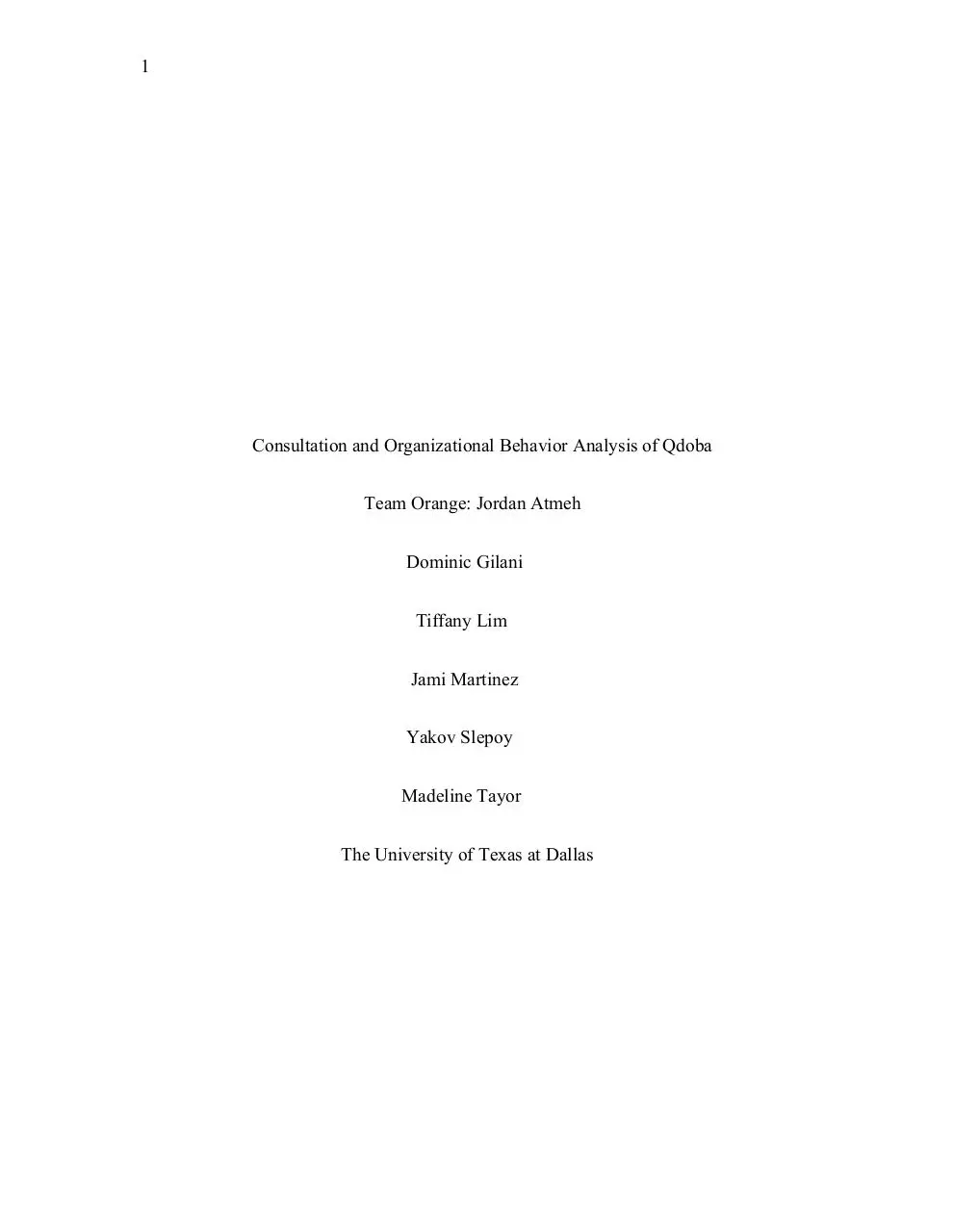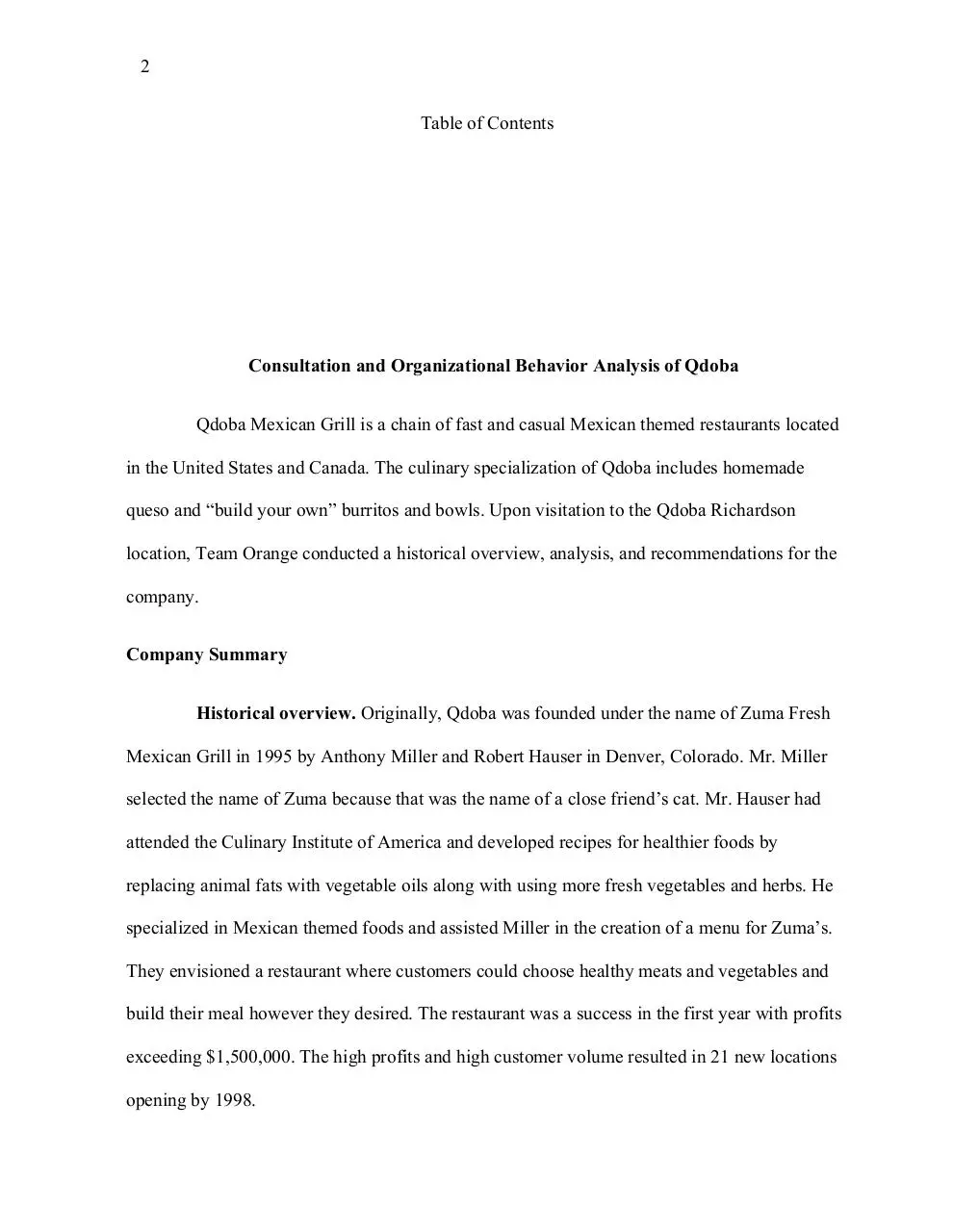Final QDoba Paper (PDF)
File information
Author: Dominic Gilani
This PDF 1.4 document has been generated by Writer / OpenOffice 4.1.1, and has been sent on pdf-archive.com on 22/07/2015 at 15:44, from IP address 108.19.x.x.
The current document download page has been viewed 625 times.
File size: 2.26 MB (21 pages).
Privacy: public file





File preview
1
Consultation and Organizational Behavior Analysis of Qdoba
Team Orange: Jordan Atmeh
Dominic Gilani
Tiffany Lim
Jami Martinez
Yakov Slepoy
Madeline Tayor
The University of Texas at Dallas
2
Table of Contents
Consultation and Organizational Behavior Analysis of Qdoba
Qdoba Mexican Grill is a chain of fast and casual Mexican themed restaurants located
in the United States and Canada. The culinary specialization of Qdoba includes homemade
queso and “build your own” burritos and bowls. Upon visitation to the Qdoba Richardson
location, Team Orange conducted a historical overview, analysis, and recommendations for the
company.
Company Summary
Historical overview. Originally, Qdoba was founded under the name of Zuma Fresh
Mexican Grill in 1995 by Anthony Miller and Robert Hauser in Denver, Colorado. Mr. Miller
selected the name of Zuma because that was the name of a close friend’s cat. Mr. Hauser had
attended the Culinary Institute of America and developed recipes for healthier foods by
replacing animal fats with vegetable oils along with using more fresh vegetables and herbs. He
specialized in Mexican themed foods and assisted Miller in the creation of a menu for Zuma’s.
They envisioned a restaurant where customers could choose healthy meats and vegetables and
build their meal however they desired. The restaurant was a success in the first year with profits
exceeding $1,500,000. The high profits and high customer volume resulted in 21 new locations
opening by 1998.
3
However, many restaurants sued Zuma Fresh Mexican Grill for copyright
infringement on their names sounding too similar. Zuzu Handmade Mexican Grill in Boston
forced Zuma’s to change their name to Z-Teca Mexican Grill in 1999. After that, Z’Tejas
Southwestern Grill in Arizona and Azteca’s in Washington sued Z-Teca by stating their names
sounded too similar. Following the lawsuit, Z-Teca officially changed its name to Qdoba
Mexican Grill. In 2003, Jack in the Box Corporation purchased the Qdoba chain from ACI
Capital, which, resulted in over 600 Qdoba locations opening and operating as of 2013.
Currently, Qdoba Mexican Grill is the only wholly owned subsidiary of Jack in the Box
Corporation that allows franchising (Qdoba Restaurant, 2003).
Organizational structure. The organizational structure of the Qdoba restaurants is a
functional structure (see Appendix A for Qdoba functional structure diagram). The top of the
chain for the Richardson Qdoba consists of the franchise owner, followed by the manager. The
assistant manager reports to the manager and oversees the subdivided departments of kitchen
staff and front-end staff. Both departments have a shift supervisor that reports to the assistant
manager. An average shift consists of roughly 4 kitchen staff members and 4 front-end staff
members. The shift supervisors oversee one 8-hour shift per day. On the corporate level, Mr.
Villagranana stated that each operating state is divided into regions, where a manager is
assigned a region. This constitutes a geographical structure on the corporate level. Each regional
manager reports to the state-level manager, and each state-level manager reports to the
corporate office of Qdoba in Denver, Colorado. The Denver corporate office feeds into the Jack
in the Box headquarters in San Diego, California. Both corporate offices are intertwined for
4
operational functions for Qdoba restaurants. However, very little information about the
corporate structure of Qdoba can be found online or through primary sources.
Mission statement. The direct mission statement encompasses the company’s loyalty
to their customers and authenticity of their food with: “We are flavor fanatics. Food is our
passion. And you loving our food is our promise. We encourage you to experiment with our
unique flavors. Ask us for a sample of anything. Try something new. Create a dish from scratch
that’s uniquely your own. And if you aren’t completely satisfied with what you ordered, bring it
back. We’ll gladly prepare something else free of charge.” This mission can be found on
Qdoba’s company website, as well as on their to-go bags and beverage vessels. Qdoba feels that
the customer has a right to choose what they want to eat and how they want that food. The
mission statement and spirit of Qdoba is epitomized in their motto “We Live Food.” This
alludes to their authentically inspired dishes that are flavorful, unique, and offer a variety of
entrée selections for their customers.
Organizational Commitment
Employees are generally able to commit to their organization through many means,
regarding fiduciary purposes and situational circumstances. There are some employees that
develop high levels of organizational commitment, and they are able to increase their work
performance, profitability, and productivity. By creating a family oriented work team, Qdoba
has exemplified affective commitments within their employees in the organization, yet they lack
continuance commitment for all employees and normative commitment in general.
At Qdoba restaurants, everyone is treated like family, or “familia”, to which
employees and managers are acquainted with one another in and out of the workplace. Antonio
5
Villagranana, Assistant Manager for the Qdoba Richardson location, annunciated that he has
never worked with a company that has a better work environment than Qdoba. He also says that
he could not imagine working for another company because he is happy there and has a sense of
belonging. Mr. Villagranana stated that the employees spend several hours of the workday
interacting with one another. When the employees are not at work, they go together to the
movies, haunted houses, weddings, and other social functions. This demonstrates that the Qdoba
work team has an emotional attachment to the company, fostering affective commitment.
Following the erosion model, the turnover rate is low at Qdoba as a result of the strong
emotional commitment.
The company hires from within its staff, which makes job promotion equal to all
employees and increases work performance for those seeking a higher position. This
demonstrates a cost-based commitment because giving the opportunity to be promoted in a
workplace that is much like a second family creates sacrificial embededness. Once a regular
associate reaches the managerial level, the individual is open to a higher salary and health care
benefits, which can result in a longer-termed manager. If the manager were to leave the job,
they would sacrifice a salary and healthcare. By building long-term relationships with the
organization, the manager is setting roots and becoming comfortable with their continuance
commitment, which makes quitting and seeking new employment difficult because of the
incentives and benefits. However, this is not the case with all of the other employees. Anyone
who is not a manager does not get a salary, healthcare, or any other sort of benefit. Furthermore,
the veterans that are hired only receive benefits if they are managers.
6
Of the three different types of commitments (see Appendix B for commitments), it is
not apparent that many of the workers stay because they feel obligated to. Workers feel
obligated to one another due to affective commitment. The incentives and benefits the company
offers its managers create continuance commitment for them only. However, Qdoba does not
offer specific training or skill development for its employees. Active participation in their
community and charities are not associated with the company, thus creating little or no
normative commitment. It can be noted that many stars and citizens are amongst the Qdoba
employees (see Appendix C for Stars & Citizens chart). Mr. Villagranana said it might be
difficult for people to quit because everyone is supportive and involved with one another, like
the way citizens are. He also said that there are many employees who are knowledge workers
and can exceed normal performance in multiple tasks within the workplace. Since the tasks are
semi-complex, these Star employees are beneficial for overall work performance and
productivity.
Having emotionally committed workers can increase productivity, profitability, and
performance. Offering decent benefits can give a reason for employees to stay based on
continuity. But not having any normative reason for staying will not result in a guilt feeling of
staying because they ought to when the employee decides to seek alternative employment.
Team Process and Communication
Since Qdoba is in the food service industry, their businesses depend heavily on how
their employees execute their work processes and communicate together as a team. Therefore,
the daily task work processes play a major role in the success for not only the employees, but
also the company as a whole. Qdoba does an exemplary job at conducting work processes and
7
communicating on a local level, but needs to explore different means of managerial
communication at the corporate level to the local levels.
To assist with communication between all employees, Qdoba offers an online journal.
Employees can log on and communicate any idea with a single employee or with all employees
at once. They simply post the message and pick the employee that will receive that particular
message. This is very convenient for employees to have one major database outside of the work
place where they can communicate with one another. However, the preferred way that local
Qdoba managers wish to communicate with their employees is through face-to-face contact,
which can guarantee information richness. This is the most efficient because it is not likely that
the message will be mistaken in any way. Even though this is how local Qdoba managers, like
Mr. Villagranana, prefer to communicate, corporate only offers the journal as a means of
communication for employees to the managers.
Qdoba influences boundary spanning by promoting positive competition between
existing locations through means of scout activities. They inform their employees about the
sales and current customer service rankings to help motivate each location to compete with
other locations. Regional and franchise Qdoba locations are actively involved with these task
work processes. However, corporate is rarely involved with task work processes and has shown
little ambassador activities.
Staff validity and hierarchal sensitivity are utilized within Qdoba by having a full
disclosure policy. This assists the restaurant management with their decision making because
they feel like they can trust their employees. Since the cohesion and potency among the team is
strong, employees and managers can keep an open line of communication, which makes
everyone more aware of what is going on within the business. This also allows management and
8
employees to make decisions together, which can result in groupthink. Corporate does not seem
to intervene in groupthink policies with each restaurant. Mr. Villagranana stated that he has
rarely spoken to corporate management and has never met the CEO of Qdoba or any Jack in the
Box corporate affiliate.
Team Characteristics and Diversity
The employees at Qdoba are part of an environment that is dedicated to providing
authentic food for their customers. The employees interact with one another often, as well as
with management. However, team characteristics will suffer if work processes remain static. In
addition to detrimental work processes, low diversity was observed at the Qdoba Richardson
location.
At Qdoba, the employees are engaged in work teams within their given environments.
The front-end team routinely makes burritos, bowls, and other dishes in an assembly line
orientation. At the end of the line, the cashier charges the customer. The kitchen work team
prepares food and keeps the food handling area sanitized throughout the hours of operation.
Each Qdoba restaurant has a management team, which consists simply of one manager and one
assistant manager. The assistant manager, Mr. Villagranana, stated that he and the manager
coordinate daily activities. They also keep work operations running smooth and constant based
on customer traffic flow during the operating work hours.
The types of employee interdependence rely upon the task that needs to be completed.
Because the ordering stations are organized in an assembly line manner, sequential
interdependence is utilized. In order to prepare a burrito or bowl, a carbohydrate product is the
base of the dish. Then meat is added, followed by vegetables, then spices and toppings. If an
error is made in any part of the sequence, the whole dish is invalidated and the process must
9
restart. This can result in customer dissatisfaction and the staff getting upset with the employee
that made the mistake. As for the kitchen staff, cooking and cleaning duties are in a pooled
interdependence orientation. Each cook stays at one station and is expected to cook as much as
they can in a given time period. Following completion of each culinary task, the kitchen staff
then compiles the completed product. The kitchen staff encompasses additive task duties in their
team. This may not be a great model for food preparation because one employee may be slower
than the other, thus resulting in food being delivered to the front-end at different times in
different amounts.
At the Qdoba Richardson location, there doesn’t appear to be a significant difference
in the diversity of the employees. Mr. Villagranana credited that Qdoba does not look for a
specific race, religion, gender, creed, or any physical characteristic in its hiring process.
However, it was noticeable that almost every employee was of Hispanic origin or decent.
Having a majority of Hispanic employees makes sense with Qdoba being a Mexican themed
restaurant. However, a lack of diversity diminishes the use of the value in diversity problemsolving approach. There will be less variety in knowledge and expertise, which can deter
solving an issue from different angles.
Job Satisfaction
Many would think an employee’s wage would be a large indicator of job satisfaction.
On the contrary, the work that is done has a positive correlation to job satisfaction that is more
than three times as strong as an employee’s wage. A feeling of responsibility for the outcome of
one’s work is a large contributor to satisfaction with the work itself. When visiting the Qdoba
Download Final QDoba Paper
Final QDoba Paper.pdf (PDF, 2.26 MB)
Download PDF
Share this file on social networks
Link to this page
Permanent link
Use the permanent link to the download page to share your document on Facebook, Twitter, LinkedIn, or directly with a contact by e-Mail, Messenger, Whatsapp, Line..
Short link
Use the short link to share your document on Twitter or by text message (SMS)
HTML Code
Copy the following HTML code to share your document on a Website or Blog
QR Code to this page

This file has been shared publicly by a user of PDF Archive.
Document ID: 0000289549.